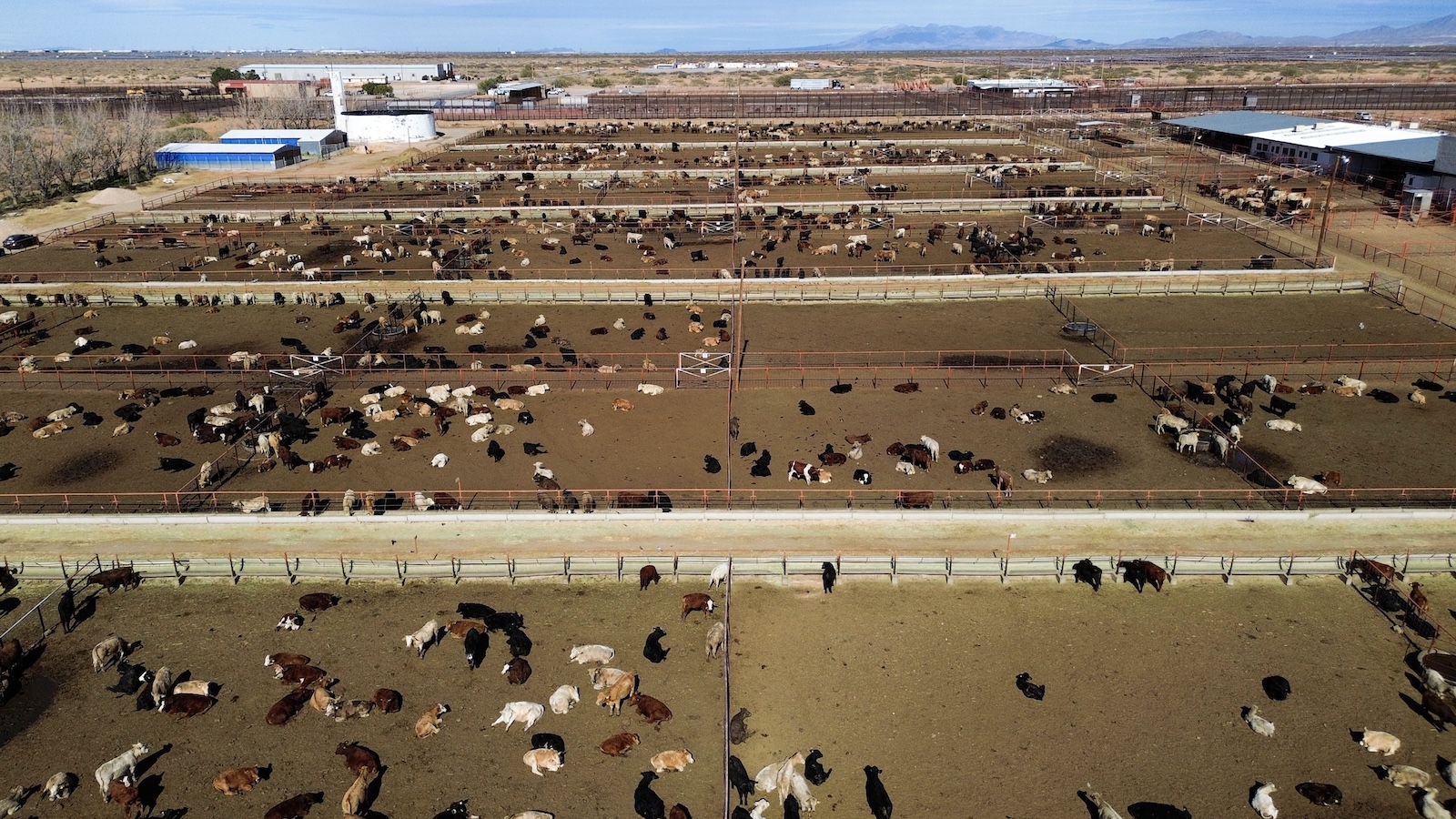Could Reversed Climate Policies Under Trump Lead To A Livestock Pest Epidemic?

Welcome to your ultimate source for breaking news, trending updates, and in-depth stories from around the world. Whether it's politics, technology, entertainment, sports, or lifestyle, we bring you real-time updates that keep you informed and ahead of the curve.
Our team works tirelessly to ensure you never miss a moment. From the latest developments in global events to the most talked-about topics on social media, our news platform is designed to deliver accurate and timely information, all in one place.
Stay in the know and join thousands of readers who trust us for reliable, up-to-date content. Explore our expertly curated articles and dive deeper into the stories that matter to you. Visit Best Website now and be part of the conversation. Don't miss out on the headlines that shape our world!
Table of Contents
Could Reversed Climate Policies Under Trump Lead to a Livestock Pest Epidemic?
The potential resurgence of livestock pests under a reversal of climate-conscious policies is a growing concern for agricultural experts and environmental scientists. While the relationship between climate change and pest outbreaks isn't always straightforward, weakening environmental regulations could significantly increase the risk of devastating epidemics impacting livestock production and food security. This article explores the complex interplay between climate change mitigation, agricultural practices, and the spread of livestock pests.
The Impact of Climate Change on Pest Populations
Climate change is already altering the landscape for livestock pests. Warmer temperatures, altered rainfall patterns, and increased frequency of extreme weather events can significantly impact pest survival, reproduction, and geographic distribution. For example, ticks, carriers of diseases like Lyme disease and anaplasmosis which affect cattle, thrive in warmer, wetter conditions. A change in climate can expand their habitat range, leading to increased infestations in previously unaffected areas. Similarly, the life cycles of many insects are directly influenced by temperature, with warmer temperatures accelerating their development and increasing the number of generations per year.
Trump-Era Rollbacks and Their Potential Consequences
During the Trump administration, several environmental regulations were rolled back. These included measures aimed at reducing greenhouse gas emissions, protecting water quality, and managing pesticide use. The potential consequences for livestock pest management are multi-faceted:
- Increased Pesticide Use: Relaxed regulations could lead to a greater reliance on chemical pesticides, potentially accelerating the development of pesticide resistance in pest populations. This would necessitate even stronger and more frequent applications, posing environmental and health risks.
- Weakened Monitoring and Surveillance: Reduced funding and oversight for pest surveillance programs could hinder early detection and response to outbreaks, allowing infestations to spread unchecked before effective control measures can be implemented.
- Habitat Degradation: Policies that prioritize resource extraction over conservation can lead to habitat degradation and fragmentation. This can increase the stress on livestock and make them more vulnerable to pests and diseases.
Specific Pests of Concern:
Several livestock pests are particularly sensitive to climate change and could experience population booms under less stringent environmental regulations. These include:
- Ticks: As mentioned earlier, warming temperatures expand their range and activity period.
- Flies: Increased humidity and temperature can lead to higher fly populations, resulting in greater transmission of diseases like screwworm.
- Mites: Changes in climate can alter the prevalence of parasitic mites that affect poultry and other livestock.
The Economic and Social Implications
An increase in livestock pest epidemics could have severe economic and social consequences. Farmers could face significant losses in livestock production, leading to higher food prices and potential food shortages. The increased use of pesticides could also impact human health and the environment.
The Path Forward: A Call for Proactive Measures
Mitigating the risks associated with livestock pest outbreaks requires a multi-pronged approach:
- Strengthening environmental regulations: Reinstating and strengthening environmental protections is crucial to limit the impact of climate change on pest populations.
- Investing in research and development: Developing new and sustainable pest management strategies, including biological control methods, is vital.
- Improving surveillance and early warning systems: Robust monitoring systems are needed to detect outbreaks early and prevent their spread.
- Promoting sustainable agricultural practices: Adopting sustainable farming practices that minimize the environmental impact of agriculture can reduce pest pressure.
The potential link between reversed climate policies and livestock pest epidemics is a serious issue demanding urgent attention. Proactive measures are crucial to prevent future outbreaks and safeguard both livestock production and public health. Ignoring this potential threat could have devastating consequences for global food security and economies.

Thank you for visiting our website, your trusted source for the latest updates and in-depth coverage on Could Reversed Climate Policies Under Trump Lead To A Livestock Pest Epidemic?. We're committed to keeping you informed with timely and accurate information to meet your curiosity and needs.
If you have any questions, suggestions, or feedback, we'd love to hear from you. Your insights are valuable to us and help us improve to serve you better. Feel free to reach out through our contact page.
Don't forget to bookmark our website and check back regularly for the latest headlines and trending topics. See you next time, and thank you for being part of our growing community!
Featured Posts
-
 Dior Cruise 2026 Exploring The Ancient Citys Influence
May 28, 2025
Dior Cruise 2026 Exploring The Ancient Citys Influence
May 28, 2025 -
 Harvards Elitism A Convenient Target For Trumps Criticism
May 28, 2025
Harvards Elitism A Convenient Target For Trumps Criticism
May 28, 2025 -
 Closure After 78 Years Four Airmen From Non Recoverable Wwii Crash Identified
May 28, 2025
Closure After 78 Years Four Airmen From Non Recoverable Wwii Crash Identified
May 28, 2025 -
 Should Investors Hold Or Sell Sirius Xm Stock A Deep Dive
May 28, 2025
Should Investors Hold Or Sell Sirius Xm Stock A Deep Dive
May 28, 2025 -
 After 26 Years Gary Linekers Exit From Bbcs Match Of The Day Confirmed
May 28, 2025
After 26 Years Gary Linekers Exit From Bbcs Match Of The Day Confirmed
May 28, 2025
Latest Posts
-
 Grief And Outrage Ambassadors Testimony On 1300 Child Deaths In Palestine
May 30, 2025
Grief And Outrage Ambassadors Testimony On 1300 Child Deaths In Palestine
May 30, 2025 -
 George Straits Emotional Farewell 73 Year Old Country Icon Delivers Tearful Eulogy
May 30, 2025
George Straits Emotional Farewell 73 Year Old Country Icon Delivers Tearful Eulogy
May 30, 2025 -
 Passengers Chase Birds On Delta Flight Viral Video Captures Chaos
May 30, 2025
Passengers Chase Birds On Delta Flight Viral Video Captures Chaos
May 30, 2025 -
 Sensacional Henrique Rocha Vence Na Estreia Em Roland Garros
May 30, 2025
Sensacional Henrique Rocha Vence Na Estreia Em Roland Garros
May 30, 2025 -
 Courtroom Drama Ex Employees Shocking Testimony Against Sean Diddy Combs
May 30, 2025
Courtroom Drama Ex Employees Shocking Testimony Against Sean Diddy Combs
May 30, 2025
